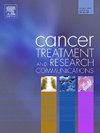Genome-wide cell-free DNA methylation profiling in advanced stage ovarian cancer. Are we looking at the tumor or the patient's immune response to the tumor?
IF 2.4
Q3 Medicine
引用次数: 0
Abstract
The aim of this study was to identify differentially methylated regions in cell-free DNA (cfDNA) between healthy persons and patients with advanced stage ovarian cancer (ASOC) and to identify differences in cfDNA methylation before and after cytoreductive surgery. Plasma-derived cfDNA was analyzed by a high-throughput genome wide DNA methylation sequencing technique: MeD-seq. A training set of therapy naïve cfDNA samples of patients with ASOC (≥FIGO stage IIIB, n=10) was compared with cfDNA of healthy controls (n=10) to define a ASOC specific cfDNA methylation signature. A cumulative hypermethylation score was constructed and a validation set of pre- and postoperative samples of 39 patients were compared using this score. MeD-seq results of tumor tissue samples were correlated with cfDNA results. Patients with ASOC showed a clear distinct cfDNA methylation signature from healthy controls (p<0.0001). This cfDNA-methylation signature resulted in preoperative hypermethylation scores (135; interquartile range 110–163) that were significantly higher than postoperative hypermethylation scores (91; interquartile range 76–101) (p<0.001). The cfDNA methylation signature at baseline differed from tumor tissue and was more closely related to DNA methylation of immune-related cells (T-lymphocytes, neutrophil granulocytes, monocytes, and B-lymphocytes) than to ASOC tissue.
MeD-seq provides a promising method for genome wide methylation profiling of cfDNA. Patients with ASOC could clearly be distinguished from healthy controls and differed pre- and postoperatively.
晚期卵巢癌全基因组无细胞DNA甲基化分析。我们是在看肿瘤还是病人对肿瘤的免疫反应?
本研究的目的是鉴定健康人与晚期卵巢癌(ASOC)患者游离细胞DNA (cfDNA)中的差异甲基化区域,并鉴定细胞减少手术前后cfDNA甲基化的差异。血浆源性cfDNA采用MeD-seq高通量全基因组DNA甲基化测序技术进行分析。将ASOC患者(≥FIGO IIIB期,n=10)的治疗训练集naïve cfDNA样本与健康对照(n=10)的cfDNA进行比较,以确定ASOC特异性cfDNA甲基化特征。构建累积超甲基化评分,并使用该评分比较39例患者的术前和术后样本验证集。肿瘤组织样本的MeD-seq结果与cfDNA结果相关。ASOC患者的cfDNA甲基化特征与健康对照明显不同(p<0.0001)。这种cfdna甲基化特征导致术前高甲基化评分(135;四分位数范围110-163)显著高于术后高甲基化评分(91;四分位数范围76-101)(p<0.001)。基线时的cfDNA甲基化特征与肿瘤组织不同,与免疫相关细胞(t淋巴细胞、中性粒细胞、单核细胞和b淋巴细胞)的DNA甲基化关系更密切,而与ASOC组织的DNA甲基化关系更密切。MeD-seq为cfDNA的全基因组甲基化分析提供了一种很有前途的方法。ASOC患者可以明显地与健康对照区分开,并且术前和术后也有所不同。
本文章由计算机程序翻译,如有差异,请以英文原文为准。
求助全文
约1分钟内获得全文
求助全文
来源期刊

Cancer treatment and research communications
Medicine-Oncology
CiteScore
4.30
自引率
0.00%
发文量
148
审稿时长
56 days
期刊介绍:
Cancer Treatment and Research Communications is an international peer-reviewed publication dedicated to providing comprehensive basic, translational, and clinical oncology research. The journal is devoted to articles on detection, diagnosis, prevention, policy, and treatment of cancer and provides a global forum for the nurturing and development of future generations of oncology scientists. Cancer Treatment and Research Communications publishes comprehensive reviews and original studies describing various aspects of basic through clinical research of all tumor types. The journal also accepts clinical studies in oncology, with an emphasis on prospective early phase clinical trials. Specific areas of interest include basic, translational, and clinical research and mechanistic approaches; cancer biology; molecular carcinogenesis; genetics and genomics; stem cell and developmental biology; immunology; molecular and cellular oncology; systems biology; drug sensitivity and resistance; gene and antisense therapy; pathology, markers, and prognostic indicators; chemoprevention strategies; multimodality therapy; cancer policy; and integration of various approaches. Our mission is to be the premier source of relevant information through promoting excellence in research and facilitating the timely translation of that science to health care and clinical practice.
 求助内容:
求助内容: 应助结果提醒方式:
应助结果提醒方式:


